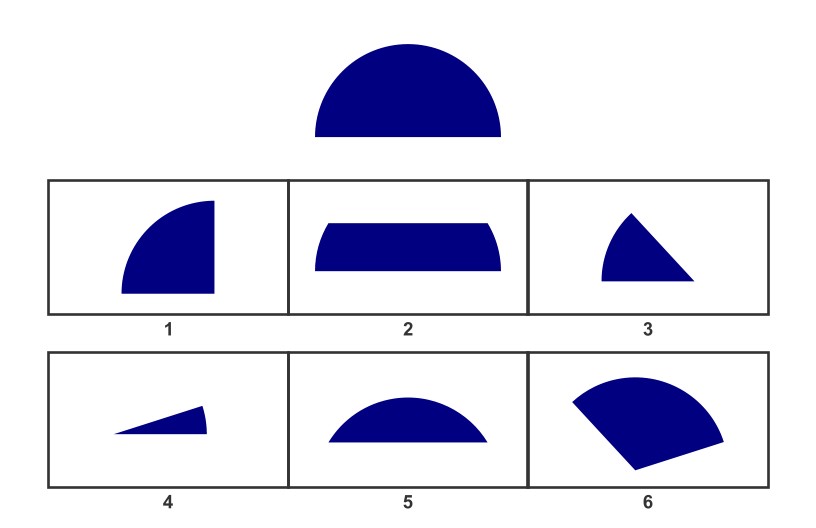WISC Practice Test for 10-year-olds
The Wechsler Intelligence Scale for Children (WISC) test is often used as an entrance exam for gifted and talented programs for determining cognitive strengths and weaknesses, and is individually administered, usually by a psychologist.
This comprehensive, clinical instrument assesses the cognitive intelligence of children aged 6 years 0 months through 16 years 11 months. The major difference between how the test is given to each age is the starting point of the test; older kids will start at more difficult sections of each subtest. The WISC-V is the updated version which has more interpretive power, is more user-friendly and is also more efficient.
Testingmom.com helps prepare your child for the WISC-V test by providing challenging questions and games, and by making learning interesting and fun for your ten-year-old! We have 100’s of practice tests and games that will fully prepare your child for the WISC-V. Below are a couple of examples of our practice questions.
1. Fluid Reasoning – Arithmetic
Deana went shopping for ingredients to make a salad. If she paid $4.00 for lettuce, $2.20 for tomatoes, $1.80 for onions, $2.00 for carrots, and $3.75 for avocados, how much change would she get back if she gave the cashier $15?
Answer: $1.25
2. Verbal Comprehension – Similarities
Parent Instructions
Ask your child each question out loud. There are no pictures to show for this section. The actual subtest consists of 23 items. This subtest gets progressively harder and is discontinued after the child misses 4 questions in a row.
How are excitement and sadness alike?
Answer: Both are emotions
3. Visual Spatial Reasoning – Visual Puzzles
The Visual Puzzle subtest measures your child’s ability to analyze and synthesize visual-spatial information. Within 30 seconds, your child views a completed puzzle, then chooses the 3 pieces that, when combined, make up that puzzle. In some cases, 1 or more of the pieces will need to be “mentally rotated” to fit into the puzzle.
Parent Instructions
Parent, say to your child: “Look at the shape on top. That is a completed puzzle. Choose the 3 pieces below that combine to complete the puzzle.”
-As the puzzles get harder, your child may have to mentally rotate or flip 1 or more puzzle pieces to make it fit into the puzzle.
-Your child’s responses can be in any order.
-Your child can point to or say out loud the numbers that make up her answers.
-Your child must select 3 pieces. In some cases, 2 pieces might complete the puzzle, but that isn’t the correct answer. There will always be 3 pieces that combine to make up the puzzle.
*On the test, students have 30 seconds to answer. Timing starts from the end of the question asked. When you are practicing this skill, don’t worry about the timing. Your child will get faster with practice. Just know that this is a timed part of the test.

Answer: 3, 4, 6
See if TestingMom.com supports your child’s test by your school district. If you don't see your child's school district listed, check with us! We have practice for other tests as well.



Tell us about your experiences
8 Responses
grazzy6@yahoo.ca
Great.
Someone
Grade five, younger than most people.
jenniele1129@gmail.com
Very Nice ( thanks for the free questions.)
AHNAF ATEF FORHAD
interested
sandykuo2088@gmail.com
How to get the 10yo sample for WISC test
TestingMom.com
Hello,
Please email us at help@testingmom.com and we can help walk you through the process of finding more resources for the WISC test.
Sulbha
My child has been chosen after ccat test grade 4 ontario curriculum .they will take his psychological testing..i want to have some sample of questions to k ow more about the type of questions he will face
TestingMom.com
Thank you for reaching out to us regarding your child’s upcoming psychological testing following their successful performance on the CCAT Test for Grade 4 in the Ontario curriculum. We understand your concern and are happy to provide you with some sample questions to give you an idea of what your child can expect during the testing.
It’s important to note that psychological testing can vary depending on the specific assessment being used. However, the tests generally measure cognitive, emotional, and behavioral aspects of a child’s development. Below, we’ve provided a few sample questions to give you a rough idea of what your child might encounter during their psychological evaluation:
Cognitive Assessment:
Verbal Reasoning: “What is the relationship between a cat and a lion?”
Non-Verbal Reasoning: “Choose the picture that best completes the pattern.”
Memory: “Listen to this list of words and try to remember as many as you can.”
Emotional Assessment:
“Can you tell me about a time when you felt really happy?”
“What do you do when you feel sad or upset?”
Behavioral Assessment:
“How do you usually behave when you’re angry or frustrated?”
“What strategies do you use to resolve conflicts with your friends?”
Please keep in mind that these are just a few examples, and the actual questions your child will encounter may be different. The psychologist conducting the assessment will tailor the questions to your child’s specific needs and situation.
It’s essential to remind your child that there’s no need to feel anxious about the testing process. The goal of psychological testing is to gain a better understanding of your child’s strengths and areas that may require additional support, allowing educators to develop an appropriate and individualized plan for their academic success.